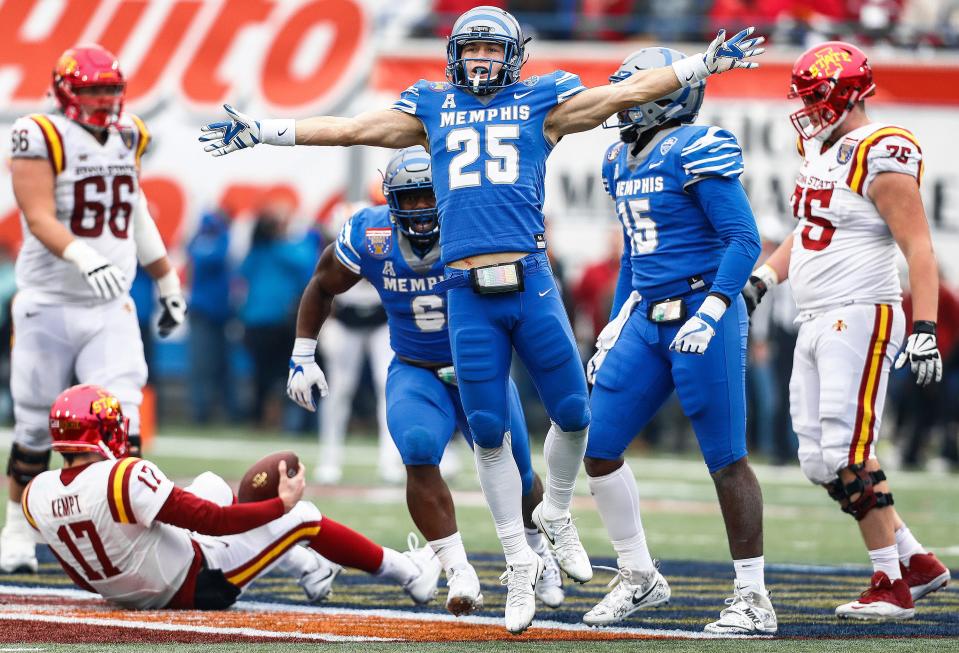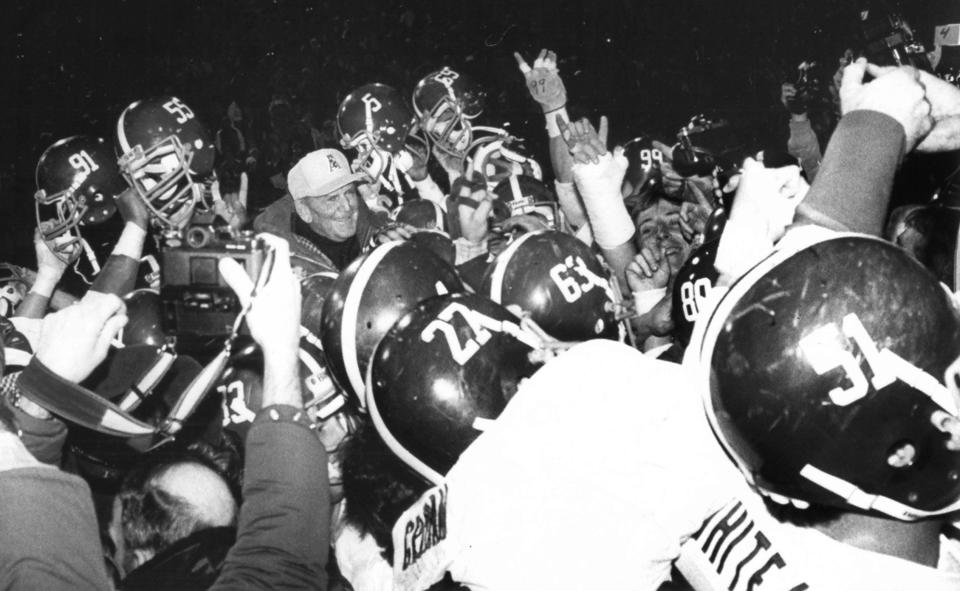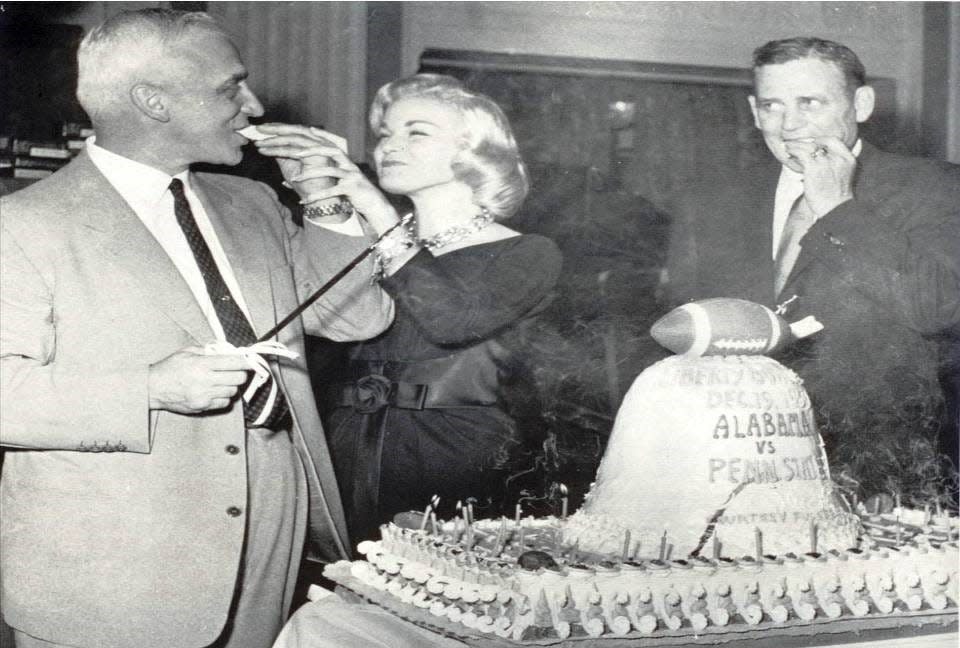AutoZone Liberty Bowl turns 65 years old with no signs of slowing down
There’s the Rose Bowl — the granddaddy of them all — followed by the Orange, Sugar, Sun, Cotton, Gator and Citrus bowls.
And the next bowl in line, in terms of longevity, will be played for the 65th time Dec. 29 when the University of Memphis and Iowa State meet at 2:30 p.m. in the AutoZone Liberty Bowl at Simmons Bank Liberty Stadium.
There were only nine postseason games in 1965 when the Liberty Bowl, which began in 1959 in Philadelphia, relocated to the Bluff City and its new Memphis Memorial Stadium. Securing a bowl game in that era was considered a coup for a community.
The late A.F. `Bud’ Dudley, the game’s founder, had held the 1964 Liberty Bowl at an indoor facility in New Jersey — the Atlantic City Convention Hall — after five years in frigid Philadelphia, but was looking for a new locale, preferably in a warmer, Southern climate.
His search led him to Memphis, one of several stops on his relocation tour. A group of Memphis businessmen pitched the city’s strengths to Dudley, a former athletics director at Villanova, in a lengthy meeting.
“They were bound and determined they weren’t going to let him leave until he decided to come here,” said Bill Stemmler, 81, who spent 13 years as the game’s treasurer beginning in the early 1970s.

Dudley accepted their offer and the Liberty Bowl began a storied run, bringing the city national attention via network and cable television exposure through the game’s patriotic theme and its presentation of stars from halftime entertainment to legendary coaches and players on the field. Four Heisman Trophy winners have played in the game, including Doug Flutie and Bo Jackson.
Peggy Dudley, Bud’s daughter, remembers moving to Memphis as a teenager and watching her father host team selection committee meetings in the office of his East Memphis home.
“They’d meet every Sunday,” Peggy said. “The house was long and dad’s office was on one end. Back then (bowl games) didn’t have conference (tie-ins) so they’d meet and stay all day, maybe talking on the phone to (Penn State coach) Joe Paterno or (Alabama coach) Paul `Bear’ Bryant (to recruit them to the bowl). My mom would always prepare snacks. I can’t believe it’s been 65 years. There’s nothing that lasts 65 years . . . not even a Maytag washer.”
While some collect Social Security at 65, the Liberty Bowl continues to gather memories. Here are a few highlights from the game’s 59 years in Memphis.
The Bear Bryant game

There’s not a more significant game in the bowl’s history than the 1982 pairing of Alabama Crimson Tide and Illinois Fighting Illini. Bryant, one of the sport’s legends, made this his final game.
Reggie Barnes, in 1982, was a member of the Liberty Bowl’s team selection committee, a group given the task of actively recruiting college football programs to play in the annual postseason event.
After some late-November deliberation, the committee was giving strong consideration to Vanderbilt, which was enjoying a rare successful season in the challenging Southeastern Conference. Trow Gillespie, also on the selection committee and a Vanderbilt alum, was thrilled, according to Barnes.
Then the phone in the room rang.
Bryant was on the line. He needed to talk to team selection committee chairman Tim Treadwell. Minutes later, Treadwell re-emerged with a simple proclamation. Alabama, not Vanderbilt, would be playing in the upcoming Liberty Bowl.
“Boys, we’ve got our team,” Treadwell said. “Coach Bryant wants to come here.”
Gillespie spoke up. He asked about Vanderbilt being the committee favorite before the phone call from Bryant.

“So Tim said to the group: `Let’s take a vote’,” Barnes said. “The only vote for Vandy was from Trow.”
During that era, it was impossible to turn down a request from Bryant. He was the winningest coach in college football, in addition to being an icon, the gravelly voiced leader known for wearing a houndstooth hat and suit and tie on the sidelines. In 25 seasons as Alabama’s coach, the Crimson Tide won six national titles.
His decision to play in Memphis became historic a few weeks after the Liberty Bowl’s invitation when Bryant announced on Dec. 15, 1982, it would be the final game of his legendary career. Alabama defeated Illinois, 21-15, in the game, giving the 69-year-old Bryant his 323rd victory.
Before the game, Dudley estimated more than 200,000 tickets could have been sold. Bowl officials issued more than 1,000 media credentials.
The moment in Liberty Bowl history was magnified a few weeks later when, on Jan. 26, 1983, Bryant died one day after being admitted to an Alabama hospital after suffering chest pains. He was buried two days later at Elmwood Cemetery in Birmingham.
Kathy Crider, 77, joined the Liberty Bowl staff in 1969 when tickets to the game sold for $6.50. She said she took her son, John, to the media tent following the Alabama-Illinois game so he could hear Bryant’s final press conference.
“He was very young,” Crider said. “I told him to watch. I told him this was history. My son still talks about it.”
The University of Memphis makes its Liberty debut
For the hometown college football team, it took slightly more than 50 years to land a spot in the hometown bowl. The berth was the most prestigious invite, to that point, in the school’s history, superseded two years later when the Tigers were invited to the Cotton Bowl opposite Penn State.
The 2017 Liberty Bowl featured Memphis and Iowa State – the same teams who will appear this year -- and drew a crowd of more than 57,000. Iowa State won, 21-20, but the UofM program gained a deserved share of national attention.
“It was a special game to be a part of,” said Mike Norvell recently. Norvell was the Memphis coach in 2017 and departed for Florida State after the 2019 regular season. He led Florida State to an undefeated season in 2023. As for the Liberty Bowl's impact on the program, Norvell said: “It’s something I’ll always remember.”
The game represented another significant step for the program, which had recovered from a 32-year bowl drought in 2003 to become a postseason fixture. This year’s Liberty Bowl will be the UofM’s 10th consecutive bowl invite and its 15th in 21 seasons.
“I think playing in the game was a home run for us, from a student-athlete experience,” said former UofM athletics director Tom Bowen, who serves as Chief Philanthropy Officer for Catholic Charities of the Archdiocese of San Francisco. “We were very proud to be a part of it. It was very good to be a part of it.”
The game also was the team’s fourth straight bowl after recovering from a five-year postseason absence.
“(Former) coach Justin Fuente played in the inaugural Miami Beach Bowl (in 2014) to re-start things," Bowen said. "And to see another great season under coach Norvell was rewarding. It was a wonderful year. And in the bowl game he coached well, his kids played well. It was a great game.
“I was proud of his ability to continue the legacy (re-started) by Justin Fuente, that was carried on by Mike Norvell and that is now being carried on by Ryan Silverfield. I’m very proud of what Memphis football has become.”
Back-to-back Heismans
In what would be difficult to duplicate in today’s college football climate – and nearly impossible as the sport expands to a 12-team playoff in 2024 – the 1983 and 1984 Liberty Bowls included Heisman Trophy winners.
The string began in 1983 when quarterback Doug Flutie led Boston College into the game against Notre Dame. The Fighting Irish survived, 19-18, as a result of a missed BC extra point attempt, but the talented and charismatic Flutie earned most valuable player honors in frigid conditions. Temperatures were in the teens. Dudley, a Notre Dame alum, got a wish fulfilled by having the Fighting Irish participate.
And in 1984, Auburn running back Bo Jackson became the second Heisman winner to make an impact in the Liberty Bowl when the Tigers played the Arkansas Razorbacks. He rushed for 88 yards and two touchdowns, including the game-winning 39-yarder in the fourth quarter. Like Flutie, Jackson was named MVP as Auburn beat Arkansas 21-15.
“He’s everything they advertised,” said Arkansas noseguard Tony Cherico of Jackson's skill set after the game. “On that long (39-yard) run I’d never seen a back that fast. He just exploded and was gone.”
Service academies arrangement
Dudley struck a deal in the late 1980s to invite the winner of the annual Commander’s-In-Chief Trophy – either Army, Navy or Air Force – to play an at-large opponent. While the idea was noble, particularly because of the bowl’s patriotic theme, it didn’t work as intended.
In the four years of the arrangement, only the Air Force represented the academies, forcing bowl officials to discontinue the deal.
Despite the lukewarm reception locally, several of the games drew the largest crowds in the bowl’s history, mostly because of a regional Southeastern Conference opponent appearing opposite Air Force. The 1991 game between Air Force and Mississippi State drew 61,497, the third-largest crowd in history. The 1989 game between Air Force and Ole Miss attracted 60,128, the fifth-largest.
The post Dudley era
Steve Ehrhart, a former United States Football League executive and original Memphis Showboats general manager in the mid-1980s, took over in 1994 as the game’s executive director and this year is celebrating his 30th year in charge.
A lot has transpired under Ehrhart’s watch. He secured the game’s first title sponsorships, including the one with Memphis-based AutoZone that is in its 20th year. On the field, he matched champions from two Group of Five leagues, the Mountain West and Conference USA, from 1999 to 2005. The current arrangement inviting schools from the Southeastern and Big 12 conferences started in 2013.
Memphis, from the American Athletic Conference, moved into the SEC’s spot this year because the SEC didn’t have enough bowl eligible teams.
Ehrhart said much has changed since he became executive director, especially the proliferation of postseason opportunities. When he moved into the role there were 19 bowl games. There are 43 bowl games this season.
“Today ESPN owns 18 bowls outright,” Ehrhart said.
He said the process of procuring teams has changed, too.
“When I stepped in there were a lot of universities recruiting us, wanting to play in our game,” Ehrhart said. “Now it’s the other way around, for sure. The bowls are vying for the teams.”
As for the future, particularly with the 12-team college football playoff beginning next season, Ehrhart is confident his game will remain a fixture on the postseason calendar. It routinely ranks among the most-watched games. Last year’s game drew 3.9 million viewers and ranked 11th overall.
“Right now, the College Football Playoff selection committee picks the 12 teams for the New Year’s Six bowls (including the four teams in the playoffs),” Ehrhart said. “Next year, they’ll pick the same number for the 12-team College Football Playoff. So the pool of available teams to bowls like the AutoZone Liberty Bowl will be unaffected.”
Freelancer Phil Stukenborg is a former staff writer and deputy sports editor for The Commercial Appeal. You can reach him at philstukenborg@gmail.com
This article originally appeared on Nashville Tennessean: AutoZone Liberty Bowl turns 65 years old: Highlights of the bowl game

